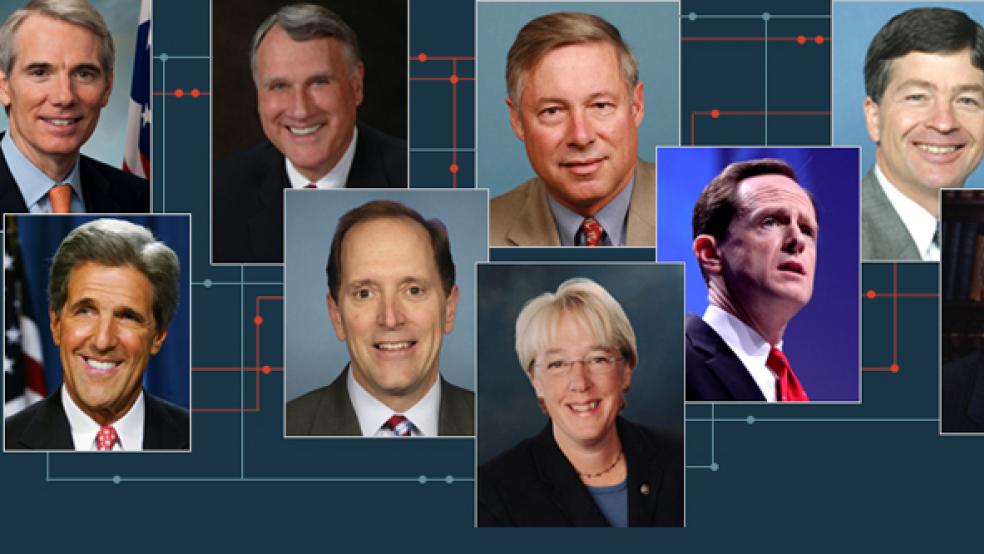The failure of the Super Committee to agree on $1.2 trillion worth of deficit reduction is neither shocking nor catastrophic for the future of the U.S. economy, a number of liberal budget experts said Monday. They acknowledge that while a deal mixing tax increases with some spending cuts would have been ideal, the absence of one actually paves the path for the 2012 presidential election.
Lawmakers essentially have a one-year grace period before $1.2 trillion in discretionary spending cuts to federal programs take effect. According to Michael Linden, director for tax and budget policy at the Center for American Progress, a liberal think tank, once December 2012 rolls around and the election is past, there’s a “golden opportunity“ for a deficit reduction deal to gel. “Both Republicans and Democrats will have a lot of incentive to do something to avoid both the automatic spending cuts and Bush tax cuts expiration. So a big deficit deal could be a reality next winter,” Linden said.
“We gave it a shot with this Super Committee and it didn’t seem to have worked out. But that isn’t a total surprise, and it certainly doesn’t mean the sky is falling,” Linden said. “We’re not Greece, or Italy, or Spain, so we do have a little bit of breathing room to figure out a game plan,” he said. Unlike the debt ceiling and continuing resolution showdowns from earlier this year, the Thanksgiving deadline for the Super Committee never carried with it the tangible threats of a U.S. default or government shutdown.
Ethan Pollack, a budget expert at the Economic Policy Institute, agreed that the lame duck session of Congress following the 2012 election could be the key to hatching a deficit reduction deal. “The Bush tax cuts and the sequester trigger are going to rear their heads whether lawmakers like it or not. So even though they [the Super Committee] failed, their existence could at least help prompt action,” Pollack said.
Despite their optimism, budget analysts on the left are agitated with how the panel’s defeat unfolded. The formation of this 12-member committee so close to the 2012 election is a root cause why negotiations flopped, said Bill Gale, a senior fellow at The Brookings Institution. “Republicans feel like they’re going to put their money on gains in the 2012 election—that they can get a better deal after that …. They hope to regain control of the Senate and the White House and put the ball in their court,” Gale said.
That waiting game is exactly what led Republicans to pass-up a Democratic proposal to reap savings from entitlement programs—a policy prescription Republicans like House Budget Chairman Paul Ryan have showcased in their deficit reduction plans—according to Robert Greenstein, President of the liberal Center on Budget and Policy Priorities. In October, Democrats on the panel released a proposal to cut deficits by $3 trillion over a decade. They proposed $1.3 trillion in revenue increases and up to $500 billion in cuts to health care entitlement programs, Medicare premium increases for high earners, and cutbacks in cost-of-living adjustments for Social Security beneficiaries.
The next day, Republicans shot down the plan and countered it with one to cut $2.3 trillion from the federal deficit with $640 billion in revenue increases—which Democrats shot down as too minimal. “Republicans missed a huge opportunity. They were offered deals by Democrats that were well to the right of the Bowles-Simpson Commission and the Gang of Six, that had smaller amounts of revenue, and included the very policies they have been advocating for,” Greenstein said. “They turned down a package that if you look back a decade or two would have been the kind moderate Republicans offered.”
In the near term, liberal analysts like Greenstein also worry that the lack of a Super Committee deal could endanger extensions of unemployment insurance benefits for the long-term unemployed and a payroll tax cut for workers, both of which expire at the end of this year. Extension provisions would likely have been attached to a super committee deficit reduction, he said. “Now, without any type of legislative vehicle, it’s harder to get that relief for the economy through Congress,” Greenstein said. “And while I hope Republicans wouldn’t take a position that would put several hundreds of millions of Americans out of work and increase the chances of a double dip recession, it does seem like more of an option without Super Committee agreement.”





